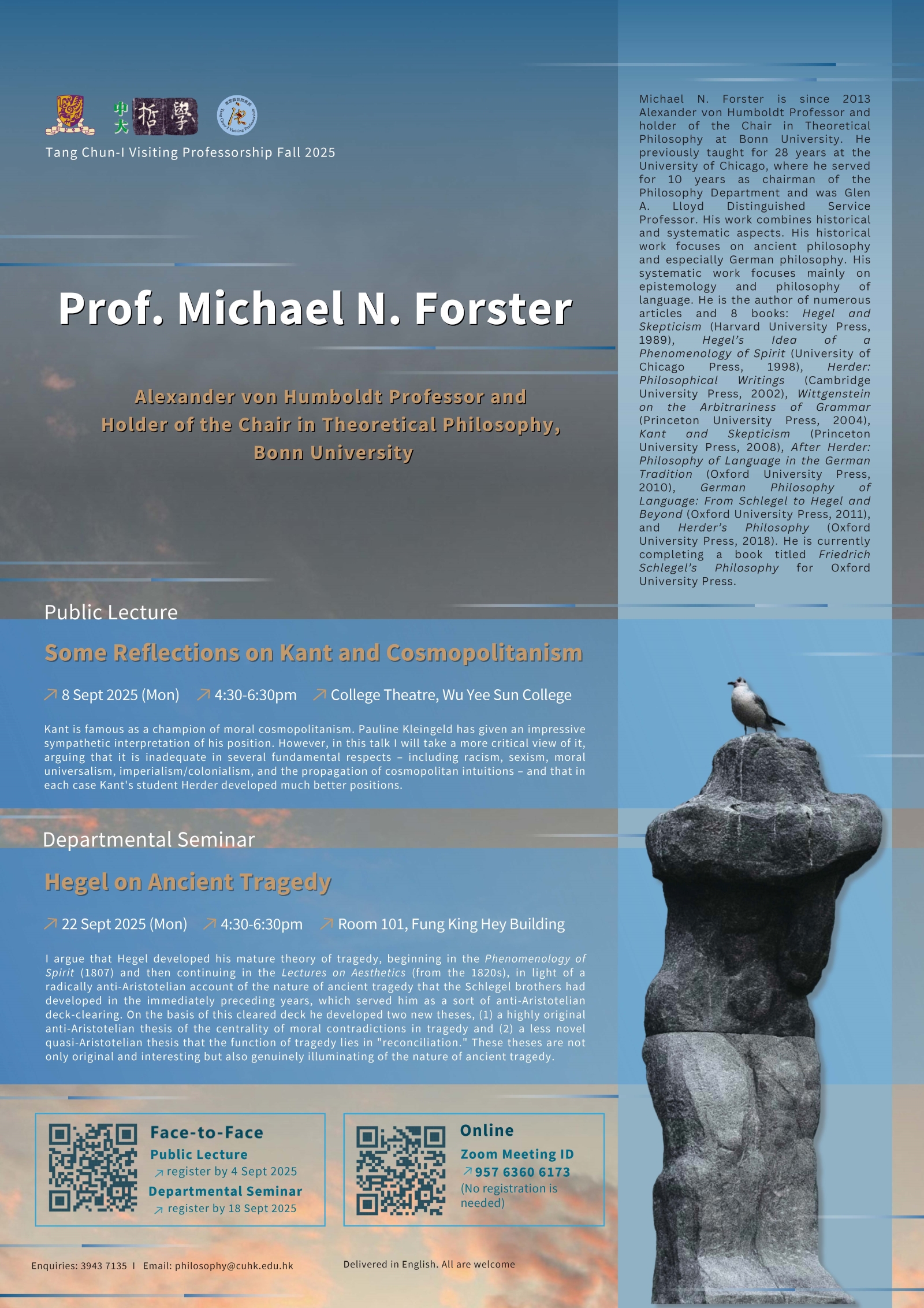
Michael N. Forster
Prof. Michael N. Forster
Alexander von Humboldt Professor and holder of the Chair in Theoretical Philosophy at Bonn University
Michael N. Forster is since 2013 Alexander von Humboldt Professor and holder of the Chair in Theoretical Philosophy at Bonn University. He previously taught for 28 years at the University of Chicago, where he served for 10 years as chairman of the Philosophy Department and was Glen A. Lloyd Distinguished Service Professor. His work combines historical and systematic aspects. His historical work focuses on ancient philosophy and especially German philosophy. His systematic work focuses mainly on epistemology and philosophy of language. He is the author of numerous articles and 8 books: Hegel and Skepticism (Harvard University Press, 1989), Hegel’s Idea of a Phenomenology of Spirit (University of Chicago Press, 1998), Herder: Philosophical Writings (Cambridge University Press, 2002), Wittgenstein on the Arbitrariness of Grammar (Princeton University Press, 2004), Kant and Skepticism (Princeton University Press, 2008), After Herder: Philosophy of Language in the German Tradition (Oxford University Press, 2010), German Philosophy of Language: From Schlegel to Hegel and Beyond (Oxford University Press, 2011), and Herder’s Philosophy (Oxford University Press, 2018). He is currently completing a book titled Friedrich Schlegel’s Philosophy for Oxford University Press.
Some Reflections on Kant and Cosmopolitanism

Joining the Face-to-Face Talks (Please register by 4 September 2025): https://cloud.itsc.cuhk.edu.hk/webform/view.php?id=13714393
Joining the Talks Online (No registration is needed):
Zoom Meeting ID: 957 6360 6173
Link: https://cuhk.zoom.us/j/95763606173
For inquiries, please email to philosophy@cuhk.edu.hk
Abstract:
Kant is famous as a champion of moral cosmopolitanism. Pauline Kleingeld has given an impressive sympathetic interpretation of his position. However, in this talk I will take a more critical view of it, arguing that it is inadequate in several fundamental respects – including racism, sexism, moral universalism, imperialism/colonialism, and the propagation of cosmopolitan intuitions – and that in each case Kant’s student Herder developed much better positions.
Conducted in English
All are welcome
Hegel on Ancient Tragedy

Joining the Face-to-Face Talks (Please register by 18 September 2025): https://cloud.itsc.cuhk.edu.hk/webform/view.php?id=13714393
Joining the Talks Online (No registration is needed):
Zoom Meeting ID: 957 6360 6173
Link: https://cuhk.zoom.us/j/95763606173
For inquiries, please email to philosophy@cuhk.edu.hk
Abstract:
I argue that Hegel developed his mature theory of tragedy, beginning in the Phenomenology of Spirit (1807) and then continuing in the Lectures on Aesthetics (from the 1820s), in light of a radically anti-Aristotelian account of the nature of ancient tragedy that the Schlegel brothers had developed in the immediately preceding years, which served him as a sort of anti-Aristotelian deck-clearing. On the basis of this cleared deck he developed two new theses, (1) a highly original anti-Aristotelian thesis of the centrality of moral contradictions in tragedy and (2) a less novel quasi-Aristotelian thesis that the function of tragedy lies in “reconciliation.” These theses are not only original and interesting but also genuinely illuminating of the nature of ancient tragedy.
Conducted in English
All are welcome




